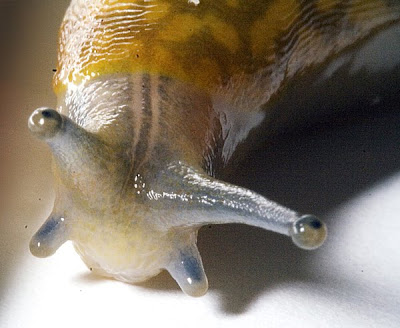Slug

A friend recently recounted the time that she discovered that not all snails live in water. Pointing out creatures on the ground around her, she asked a friend what they were. She was incredulous when told that they were snails, and it took some time to convince her that this was escargot on the hoof.
Land snails without shells or with very small shells are usually called slugs. The word comes from a Scandinavian verb meaning to move slowly, so it is quite fitting. Nouns related to that verb have meant a slothful person, a slow-moving vessel or animal, a weak or unstrung bow, and, of course, a slimy gasteropod.
Another slug, perhaps not connected to the preceding, has held these meanings over the centuries:
• a roughly formed bullet
• a strong drink
• a compact mass of liquid that retains its identity as it travels (e.g., petroleum in a pipeline, magma in a volcano)
• a cannon
• a nugget of crude metal
• rolls of clay used to make pottery
• a rod or bar of nuclear fuel
• a counterfeit coin or a token
• in newspaper editing, a brief title placed above a story to guide the editor and printer
• a component of an electromagnetic relay
A third slug, of obscure origin, has meant a hard blow, or, as in the word slugfest, a hard-hitting contest.
SIDEBAR: Louisville Slugger Museum
Now available from McFarland & Co.: Word Parts Dictionary, 2nd edition
Listen to Mike’s program in real time every Tuesday morning, 9:00 - 10:00 a.m. EST, by going to wtcmradio.com and clicking on Listen Now. There is now an archive of podcasts. Look under The Ron Jolly Show.
Write to Mike with comments or questions:
wordmallATaol.com
(substitute @ for AT above)
wordmallATaol.com
(substitute @ for AT above)
Visit the Senior Corner at http://seniors.tcnet.org


Comments